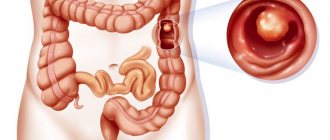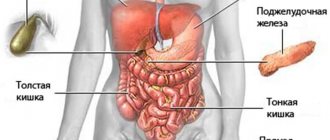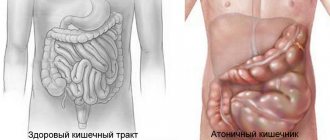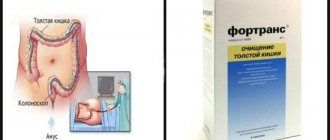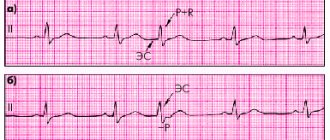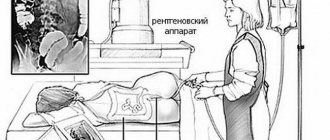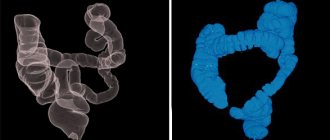Prokinetics are a group of drugs that regulate the motility of the digestive tract. Drugs with a prokinetic effect improve the movement of intestinal contents through the digestive tract, promote better functioning of the sphincter between the stomach and esophagus, and prevent the reflux of food from the stomach into the esophagus.
In Russia, the pharmacy market is represented by three prokinetics approved for use: Metoclopramide, Domperidone, Itopride. Other drugs are banned or are in development.
Types of prokinetics and names of drugs
There are several pharmacological groups of prokinetics.
Dopaminergic D2 receptor blockers
They are the most studied and widely used group of prokinetics. Drugs in this group, by blocking dopamine D2 receptors, regulate the motor activity of the digestive tract by increasing the tone of smooth muscle cells in the intestines and stomach. They have antiemetic and antihiccup effects.
- Metoclopramide (Gastrosil, Cerucal, Reglan). The peculiarity of this drug is its effect on dopamine D2 receptors and serotonin H3 receptors simultaneously. Stimulates the work of the upper digestive tract (stomach, esophagus, sphincter between these organs). Reduces the excitability of the vomiting center in the central nervous system, therefore it has proven itself well as an antiemetic agent. It has virtually no effect on intestinal motility. Use is limited by the appearance of specific adverse reactions (extrapyramidal disorders, hormonal disorders, dizziness), which is associated with penetration through the blood-brain barrier and effects on the central structures of the brain, as well as effects on the cardiovascular system (causes arrhythmias).
- Domperidone (Domperon, Motilak, Motilium). The drug belongs to the 1st generation of selective blockers of dopamine D2 receptors, which does not penetrate the blood-brain barrier and has no side effects from the central nervous system. The main effect is on the motility of the stomach and duodenum, since the largest number of peripheral D2 receptors are located there. Does not affect the intestines. The antiemetic effect is moderate. Domperidone is one of the main prokinetic drugs used in medical practice. Adverse reactions from the cardiovascular system are less common than with metoclopramide.
We recommend reading:
Drugs to improve intestinal motility
Serotonin 5-HT4 receptor agonists
Drugs of this group, acting on serotonin H4 receptors in the submucosal layer of the digestive tract, stimulate the release of acetylcholine. Acetylcholine increases the motor activity of the stomach and intestines. Studies have revealed the ability of these drugs to reduce abdominal discomfort and normalize stool in irritable bowel syndrome. At this stage, active trials of drugs from this group are underway as a promising direction in treatment.
- Tegaserod. The first synthesized agonist of serotonin H4 receptors, which showed high effectiveness in the treatment of intestinal neurosis with constipation. The disadvantages of the drug included a high percentage of side effects from the cardiovascular system. Now prohibited for use.
- Cisapride (Coordinax, Peristil). It affects the entire gastrointestinal tract, stimulating motility. Improves the passage of food through the intestines, affects the functioning of the esophageal sphincter. During the use of Cisapride, serious adverse reactions from the cardiovascular system were identified, so the drug was banned from production.
- Mosapride. Has similar properties to Cisapride. Approved for use in a number of countries (Belarus, Kazakhstan). Not registered in Russia. The disadvantages of the drug include interaction with other drugs, so it is used with caution with non-steroidal anti-inflammatory drugs, cholinergic drugs, etc.
- Prucalopride (Rezolor). It has the highest affinity for serotonin receptors, therefore it has a pronounced effect on intestinal motility. It is used in the treatment of chronic constipation, when the main groups of laxatives do not have an effect. When used, the most common side effects were headache, nausea, and abdominal pain. Registered in Russia.
Serotonin H3 receptor antagonists
The research of this pharmaceutical group began after the discovery of the properties of Metoclopramide to inhibit the functioning of serotonin H3 receptors and the advancement of the theory that part of its prokinetic properties are associated specifically with serotonin and its receptors. The synthesis of drugs that would selectively act only on H3 receptors began.
- (Latran, Zofran). The drug accelerates the movement of food from the stomach into the duodenum and normalizes the tone of the large intestine. Used in the treatment of nausea and vomiting caused by chemotherapy in cancer patients or anesthesia. It has not found widespread use in the treatment of gastroesophageal reflux disease and irritable bowel syndrome.
- Tropindole (Tropisetron, Navobane). The first drug from this group, which can normalize the functioning of the lower esophageal sphincter for a long time, preventing the reflux of gastric contents. Has a pronounced antiemetic effect. Used in cancer patients after chemotherapy.
We recommend reading:
Causes of profuse (liquid) diarrhea and methods of its treatment
New generation prokinetics with dual action
- Itopride (Ganaton, Itomed). The drug simultaneously affects dopamine D2 receptors and anticholinesterase receptors, which expands the scope of its application. It has a positive effect on the tone of the lower esophageal sphincter, preventing the reflux of gastric contents into the esophagus. At the same time, it stimulates peristalsis of all parts of the intestine, improving bowel movements during constipation. Has a moderate antiemetic effect. Does not affect the secretory activity of the stomach. Does not affect the structures of the central nervous system. In the treatment of gastroesophageal reflux disease it has proven to be better than Domperidone. The advantages of Itopride include the absence of interaction with other drugs.
The choice of prokinetic agent is based on clinical effectiveness in the treatment of different parts of the digestive tract, safety and contraindications.
Of all the listed drugs, only 2 drugs meet the effectiveness/safety conditions - Itopride and Domperidone. In the treatment of motor activity disorders of the upper gastrointestinal tract (esophagus, stomach), the drug of choice is Itopride.
When to take
Doctors have a choice when prescribing one of the prokinetics to the patient: the list of drugs is varied. The main indications for such drugs are pathologies of the digestive organs, in which gastric motility is impaired.
These include:
- reflux esophagitis;
- acute or chronic stomach ulcer;
- persistent irritable bowel syndrome;
- gastric atony, developing as a result of diabetes mellitus.
https://youtu.be/3fyyk0WQUTw
As symptomatic therapy, prokinetics should be taken to relieve:
- nausea caused by eating poor quality food;
- vomiting;
- bloating caused by many diseases, including pancreatitis;
- constipation;
- feeling of heaviness in the abdominal cavity.
Note! Prokinetics affect concentration, so they should not be taken by drivers and persons servicing precision machinery.
Natural prokinetics
- Iberogast. Herbal preparation based on extracts of 9 plants. The mechanism of action is associated with the individual effect of each plant on the digestive tract. The main point of application is the stomach. Strengthens the passage of food from the stomach, normalizes motility. Reduces the production of hydrochloric acid and increases the production of mucus in the stomach.
It differs from “chemical prokinetics” in its effectiveness combined with a high safety profile. Used in the treatment of functional dyspepsia.
In continuation of the topic, be sure to read:
- Carminative drugs for adults and children: list of medicines
- Drugs to improve intestinal motility
- Anti-diarrhea tablets: list of medications and features of their use
- Peristalsis: concept, norm and pathology
- What causes fermentation in the intestines and how to get rid of it?
- Irritable bowel syndrome: symptoms and treatments
- Measures to prevent constipation: diet and other factors
- Intestinal spasms: signs and causes of pathology, treatment methods
- Intestinal colic in a child: symptoms and treatment (first aid, medications, nutrition)
- Causes of profuse (liquid) diarrhea and methods of its treatment
Side effects
The following must be taken into account when prescribing prokinetics: the list of drugs is very extensive, and many of them have side effects.
- Tegaserod, Cisapride may increase the risk of developing angina.
- Metoclopramide may cause drowsiness.
- Lethargy.
- Negative effect on the central nervous system.
- Thirst, dry mouth.
Interesting! Symptomatic treatment of severe flatulence after childbirth
Important! Since prokinetics help speed up the movement of food through the gastrointestinal tract, they should not be taken simultaneously with medications that have a prolonged effect. It is advisable that the interval between taking such medications be at least 4 hours.
The use of prokinetics helps normalize the functioning of the digestive system in a relatively short time. In childhood and old age, treatment with these drugs is possible only under the supervision of a specialist. Self-medication with prokinetics is strictly prohibited.
Folk remedies
Vegetables from the garden can replace drugs from the pharmacy in the prevention of diseases
- Fennel;
- Motherwort;
- Chamomile;
- Oregano;
- Dandelion;
- Melissa;
- Elder;
- Dill;
- Plantain;
- Cowberry;
- Cabbage;
- Grape;
- Beet;
- Melon;
- Pumpkin;
- Carrot.
Also, when treating gastritis, it is effective to take herbal decoctions in conjunction with the main treatment. You can read about what herbs help with gastritis in the article on our website.
https://youtu.be/EzK8tVX9Eq4
"Aceclidine": instructions for use
Prokinetics - what are they, how and in what cases should they be used? In any case, it is necessary to consult a doctor and carefully read the instructions for use.
"Aceclidine" is used to eliminate loss of tone of the gastrointestinal tract and bladder after surgery, reduces intraocular pressure, and therefore can be used by ophthalmologists. Release form: solution for injection, 1-2 ml of 0.2% solution is injected subcutaneously. The maximum amount per dose is 0.004 g, with no more than 0.012 g per day. Side effects are ptyalism, sweating, diarrhea.
Contraindications for use are coronary artery disease, increased HDL content, bronchial asthma, hyperkinesis and other parkinsonisms, pregnancy, bleeding from the abdominal organs.
“Physiostigmine” is used mainly in ophthalmological practice, but sometimes it can also be used in gastroenterology for intestinal paresis. The medicine is injected under the skin in 0.5 - 1 ml of 0.1% solution. The maximum amount of the drug per day should not exceed 0.001 g.
Side effects include increased salivation, bronchospasm, intestinal muscle spasm, changes in heart rate, and convulsions.
Contraindications: angina pectoris, epilepsy, bronchial asthma, mechanical intestinal obstruction, peritonitis, sepsis, pregnancy.
"Galantamine": instructions for use
"Galantamine" is sometimes used as an antagonist for muscle relaxants in the postoperative period when the tone of the intestinal and bladder muscles decreases. Contraindications for use are hypersensitivity, epilepsy, bronchial asthma, blood pressure above 139/99 mmHg, COPD, mechanical blockage of the intestinal tube, decreased kidney function, age under 9 years.
Side effects: decreased heart rate, TTP, AV block, extrasystole, nausea, vomiting, diarrhea, dyspepsia, muscle spasms, urinary incontinence, hematuria, tremor.
Can be administered subcutaneously, intramuscularly, intravenously, transcutaneously, orally. The dose is selected individually, based on the medical history, and should be adjusted by the attending physician. The average daily dose for adults is from 10 to 40 mg, divided into two to four doses.
Dopamine receptor blockers
Drugs in this group are divided into selective and non-selective. Their action is that they stimulate the motor function of the stomach and have antiemetic properties. What are these prokinetics? The list of medications is as follows:
- "Metoclopramide."
- "Bromopride."
- "Domperidone".
- "Dimetpramide".
The main active ingredient is metoclopramide, it has been used for quite a long time. The action is as follows:
- Increased activity of the lower esophageal sphincter.
- Acceleration of stomach emptying.
- Increasing the speed of food movement through the small and large intestines.
However, non-selective drugs can cause serious side effects.
There are widely known first-generation prokinetics. List of drugs:
- "Raglan".
- "Perinorm".
- "Ceruglan".
One of the disadvantages is the ability to cause signs and symptoms of parkinsonism in adults and dyskinetic syndrome in children, and menstrual irregularities in women.
Second-generation selective drugs include drugs with the active ingredient domperidone. These medications do not cause severe side effects, but others may occur:
- Drowsiness.
- Weakness.
- Anxiety.
- Headache.
It is for this reason that drugs with the active substance domperidone are the best prokinetics. List of drugs:
- "Motilium".
- "Domidon".
- "Motinorm".
- "Motorix".
- "Gastropom".
Natural Helpers
The way the world works is that the cure for any ailment can be found in some plant, you just need to know which one. Thus, plant prokinetics are known that stimulate the motor function of the gastrointestinal tract. Here are some of them:
- Common fennel.
- Pharmaceutical camomile.
- Black elderberry.
- Dill.
- Oregano.
- Motherwort.
- Dandelion.
- Melissa.
- Swamp dry grass.
- The plantain is big.
- Alder buckthorn.
The list of plants that help improve gastrointestinal motility includes a large number of other representatives of the flora. It should also be taken into account that some vegetables and fruits have a similar effect:
- Swede.
- Melon.
- Cabbage.
- Carrot.
- Beet.
- Pumpkin.
- Cowberry.
- Grape.
The prokinetic properties of these vegetables manifest themselves very well if you take fresh juices prepared from them.
It is worth noting that you should not replace herbal medications during periods of exacerbation of diseases and without consulting a doctor.
"Itopride": instructions for use
"Itopride" combines the properties of a dopamine receptor antagonist and an acetylcholinesterase blocker. Affects the hypothalamic-pituitary-adrenal system, increasing somatostatin concentrations and reducing adrenocorticotropic hormone. The negative effect is expressed in leukopenia, thrombocytopenia, hypersensitivity reactions, hyperprolactinemia, nausea, tremor, jaundice. During administration, it is necessary to monitor the condition of peripheral blood and make sure there are no side effects.
It is not recommended for people with immediate or delayed hypersensitivity, a history of gastrointestinal bleeding, obstruction of the intestinal lumen by a foreign body or compression from the outside, under the age of sixteen, during pregnancy or breastfeeding.
Take the drug orally before meals, 50 mg three times a day.
